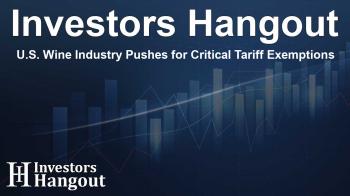U.S. Wine Industry Pushes for Critical Tariff Exemptions

U.S. Wine Trade Alliance Advocates for Wine Exemptions
In a significant development highlighted by trade negotiations, the U.S. Wine Trade Alliance (USWTA) is calling upon trade officials to ensure wine is included in the list of products exempt from proposed tariffs under the latest transatlantic trade framework. This appeal comes as the European Union prepares to implement a 15% tariff on many imports, which could have substantial implications for the American wine industry.
Importance of Including Wine in Trade Agreements
During a recent announcement, European Commission President Ursula von der Leyen addressed the potential tariffs, clarifying that many goods would face the new levy. However, she also indicated that there could be a "zero-for-zero" agreement that might allow specific products, including wine, to be exempted. The USWTA emphasizes that without such an exemption, American businesses, employees, and consumers could face negative consequences.
Remarks from Industry Leaders
Ben Aneff, the President of the USWTA, expressed his optimism regarding the negotiations. "This weekend's news is encouraging; we are hopeful that wine will receive preferential treatment under the exemption structure," he stated. He urged for wine's inclusion to be prioritized in the final arrangement.
On a follow-up call, President von der Leyen reiterated that the tariffs would apply generally to most sectors but did identify that zero-tariff provisions may extend to specific areas such as aircraft and some agricultural goods. She assured that details concerning wine and spirits would be clarified shortly, leaving room for potential positive developments for the wine sector.
Joint Efforts to Protect the Wine Industry
Earlier this month, the USWTA teamed up with notable organizations including Napa Valley Vintners and the Wine Institute to deliver a joint letter to trade officials, emphasizing the necessity of removing wine from the proposed tariff lists. As discussions progress, these stakeholders remain steadfast in their collective advocacy for a long-term, tariff-free trade agreement that would benefit American businesses considerably.
Economic Impact of Tariffs on the Wine Sector
Aneff highlighted the troubling effects of the declining import rates, noting, "In May alone, the steep reduction of EU wine imports resulted in a loss of $479 million for U.S. businesses within the distribution, retail, and hospitality sectors." He stressed that U.S. wine exports had plummeted by 41% compared to the prior year, emphasizing the dire economic implications for both local and international wine markets. "It is crucial to reach a comprehensive agreement that revitalizes our domestic producers and preserves American jobs tied to a robust wine market," he added.
Maintaining Economic Surplus from Wine Trade
The U.S. continues to enjoy a notable economic surplus due to the importation and sale of European wines. American companies across various segments, including importation, distribution, and retail, gain substantial value from these transactions. A coalition of U.S. wineries has vigorously expressed their wishes to the U.S. Trade Representative to facilitate a wine exemption moving forward in the negotiations.
"Safeguarding this trade surplus is vital for thousands of American jobs and small businesses," stated Aneff. "Securing a win for wine in this context would be immensely beneficial for producers and small enterprises nationwide."
About the U.S. Wine Trade Alliance
The U.S. Wine Trade Alliance (USWTA) is committed to advocating for zero tariffs on imported wine into the United States, representing all tiers of the U.S. wine industry. Through collaborative initiatives and targeted lobbying efforts, the USWTA brings together wine importers, wholesalers, retailers, and producers with the singular goal of implementing a zero-tariff policy on wine imports.
Frequently Asked Questions
What is the U.S. Wine Trade Alliance?
The U.S. Wine Trade Alliance (USWTA) advocates for policies benefiting the U.S. wine industry, focusing on eliminating tariffs on imported wines.
Why is wine included in tariff exemption discussions?
Exempting wine from tariffs is crucial to protect American jobs, support economic growth, and sustain the wine market amid proposed trade agreements.
What economic impact do tariffs have on the wine industry?
Tariffs can significantly reduce imports and exports, leading to substantial financial losses for businesses in the U.S. wine industry.
Who supports the call for wine tariff exemptions?
A wide range of organizations, including the USWTA, Napa Valley Vintners, and others, are advocating for the inclusion of wine in tariff exemption discussions.
What are the next steps in the trade negotiations regarding wine?
Continuing negotiations are expected to clarify which products, including wine, will be exempted from tariffs as trade discussions evolve and finalize.
About The Author
Contact Henry Turner privately here. Or send an email with ATTN: Henry Turner as the subject to contact@investorshangout.com.
About Investors Hangout
Investors Hangout is a leading online stock forum for financial discussion and learning, offering a wide range of free tools and resources. It draws in traders of all levels, who exchange market knowledge, investigate trading tactics, and keep an eye on industry developments in real time. Featuring financial articles, stock message boards, quotes, charts, company profiles, and live news updates. Through cooperative learning and a wealth of informational resources, it helps users from novices creating their first portfolios to experts honing their techniques. Join Investors Hangout today: https://investorshangout.com/
The content of this article is based on factual, publicly available information and does not represent legal, financial, or investment advice. Investors Hangout does not offer financial advice, and the author is not a licensed financial advisor. Consult a qualified advisor before making any financial or investment decisions based on this article. This article should not be considered advice to purchase, sell, or hold any securities or other investments. If any of the material provided here is inaccurate, please contact us for corrections.

